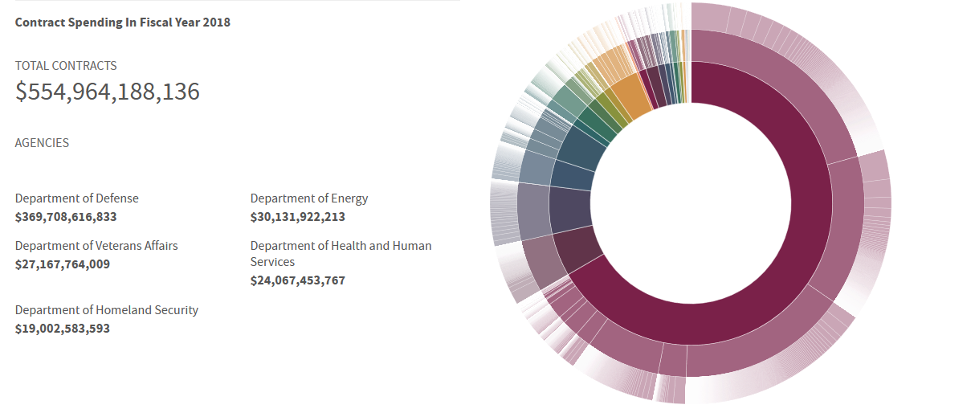The Cinderella of Government Spending: Non-Defense Contracting

When the federal government spends $1.3 trillion on Medicare and $676 billion on defense a year, it’s easy for fraud on those programs to take center stage. They are important programs, and those are massive dollar amounts. However, behind those two behemoth numbers, there are different ways the government spends its money that leave it vulnerable to fraud. Procurement by contract accounts for billions in government expenditures each year, a significant target for fraud.
According to USAspending.gov, the “federal government uses contracts to buy the things it needs, from office furniture to airplanes. It also uses contracts to buy services ranging from internet to research and development.” In FY 2018 federal government contracts totaled more than $554 billion, with more than $369 billion (66%), for defense-related procurements (about half of the defense budget). Although the remaining $185 billion in government contracting ($554 b – $369 b = $185 b) looks like a lowly stepsister compared to the amounts spent on healthcare and defense, it is still a massive amount of money.
In fact, $185 billion is the estimated net worth of the richest person in the world, Elon Musk, who displaced Jeff Bezos for that claim in 2021. Of course, net worth for these guys goes up and down (just ask Mr. Bezos whose worth declined upon his divorce), but it is still impressive that the U.S. government spends as much in non-defense related contracts as the richest person in the world is supposedly worth – every year.
It’s probably safe to assume Elon Musk has safeguards in place to protect his billions against fraud, including whatever billions he spent on his Space X Company. But so does the United States. It’s the False Claims Act. For example, NASA, the government’s space program, awarded $17 billion in contracts in FY 2018 and at least one NASA contractor paid $375,000 to resolve a False Claims Act case. It paid to settle allegations it submitted claims to NASA for assembling and cleaning rocket launch systems that it had failed to perform on one such contract.
While NASA and the world’s richest man have now joined forces in space exploration (Musk’s Space X was awarded a $2.9 billion NASA contract in 2021), other parts of the federal government procure things that more directly support the lives of average Americans on earth — like actual meat and potatoes, and open spaces to recreate. For example,
- The Department of Agriculture’s Food and Nutrition Service works “to increase food security and reduce hunger by providing children and low-income people access to food, a healthful diet and nutrition education in a way that supports American agriculture and inspires public confidence.” In FY 2018 it awarded five contractors a total of $1.69 billion to support the Service’s mission.
- The Department of Interior’s National Park Service which “preserves unimpaired the natural and cultural resources and values of the National Park System for the enjoyment, education, and inspiration of this and future generations,” awarded $885 million to five contractors to support its mission in FY 2018.
Bottom line. Our government buys a lot of “stuff.” In fact, the United States government is the world’s largest purchaser of things. Period. Behind every one of those purchases is a contract supporting an important government program. While the government spends billions on healthcare and defense, the $185 billion in other contracts, (the “stuff” the government buys) isn’t chump change either. Ask Elon Musk. If dollars were miles 185 billion would get him to the moon and back 387,190 more times.
Written by Kate Scanlan of Keller Grover, LLP
